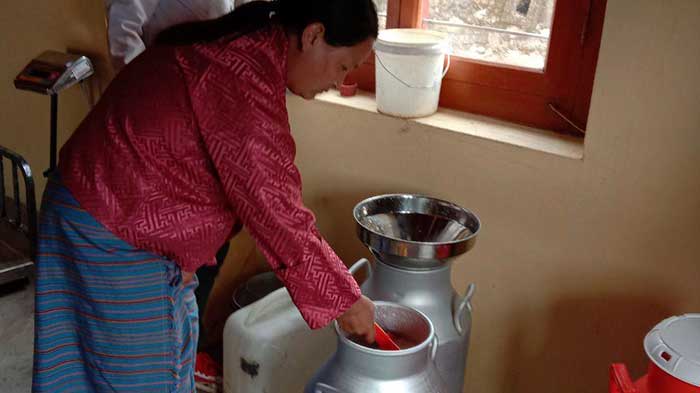Nim Dorji | Trongsa
The milk processing unit (MPU) at Dangdung in Langthel, Trongsa, which remained closed for more than a year opened yesterday.
The unit started operation in September 2018. However after three months, it had to close shop because of shortage in milk supply.
The unit was constructed with financial support from Mangdechhu Hydropower Authority and is run by 27 members of Langthel livestock development cooperative.
According to the cooperative’s chairperson, Ugyen Tshomo, most of the cows the members owned died, which led to a shortage of milk. “Without milk we couldn’t operate,” she said. “People in the community with cows, but not member of the cooperative, did not bring their milk to the unit because of the better price it fetched when sold on their own,” she said.
However in the last one year, the cooperative in collaboration with dzongkhag livestock sector has worked on a plan to make the cooperative sustainable.
Through a cost-sharing mechanism, 40 cows were handed to the members where 70 percent of the cost of a cow is borne by dzongkhang and 30 percent by the individual member. This was to encourage and help the members buy more cows.
The unit buys the milk at Nu 40 per litre from the members. The unit will be producing yoghurt, milk, butter cheese and will be making panner (raw milk cottage cheese) on demand.
There is also a plan to supply their products in nearby towns in the future. The unit also aims to promote local produce and reduce the dependency on imported products in the current Covid-19 situation.
Some of the members who can’t afford to buy cow are planning to quit, but it won’t hamper the milk supply as most members have more than two cows each.
The dzongkhag livestock sector provided technical assistance, capacity development training and other policy-level support to the cooperative.
Dzongkhag livestock officer, Jigme Chophel said that dzongkhag administration and livestock sector through the dzongkhag development grant intervened to allow farmers to invest in the business with long term sustainable strategy.
New equipment such as cream separator, yoghurt-filling machine are provided while a new butter churner is proposed. Some members of the community were trained on breed intensification through artificial insemination while the livestock sector will start fodder development.


